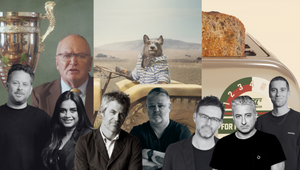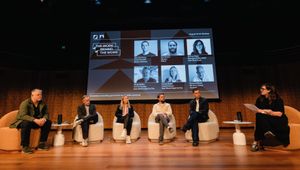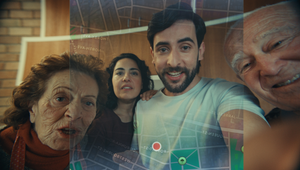
Conserving Wildlife with the Lion’s Share Fund

The Lion’s Share Fund is a unique initiative which raises much-needed funds to support wildlife conservation and animal welfare across the globe. Founded by film director Christopher Nelius and CEO and founder of FINCH, Robert Galluzzo, the project is supported by the United Nations Development Programme who manage the fund and its conservation impact.
The Lion’s Share Fund funds wildlife conservation by asking advertisers to contribute 0.5 per cent of their media spend every time animal imagery is used in an advertisement and over the next five years pledges to raise over $100 million per year. Sir David Attenborough says: “Advertisers have the real opportunity to act and deliver on these sustainable development goals by making a small change in the way they recognise animals in their advertisements.”
To hear more about the fund, which companies are a part of it and how the pair plan to navigate the Lion’s Share Fund in the future, LBB’s Natasha Patel caught up with them to hear more.
LBB> How did the idea for The Lion’s Share Fund come about?
Rob and Christopher> The idea for The Lion’s Share came about when FINCH film director Christopher Nelius was sitting at home watching cricket and having a beer. There was an Optus commercial that had a beautifully rendered CGI family of cheetahs. The entire ad was just these animals, and the product they were used to sell was phone data. And it dawned on Nelius, cheetahs have nothing to do with phone data whatsoever, furthermore, there is a huge disparity between the value of animals featuring in advertising, and the lack of private sector contribution towards their welfare.
Nelius approached FINCH with an idea - to empower brands to contribute a small amount of money to animal conservation each time an animal is used to sell a product in their marketing.
CEO of FINCH, Rob Galluzzo pitched the idea to former Mars CMO, who pledged Mars to be the founding partner if the United Nations Development Programme was onboard. Galluzzo secured a meeting and successfully pitched The Lion’s Share initiative to the UNDP. The Lion’s Share was launched in 2018 with Mars inc, and the United Nations Development Programme as founding partners.
LBB> How do you think the work has had an impact?
Rob and Christopher> The work of The Lion’s Share Fund has had a vast and positive impact, not only for the communities and organisations who are recipients of the funding. But also for the private sector brand partners who have pledged their commitment to The Lion’s Share.
Since the Fund’s launch, more than 20 conservation and animal welfare organisations have been supported with funding across 15 countries, positively impacting thousands of people in the world's most critical wildlife rich communities.
Separate to the grant recipients, the private sector is beginning to understand their potential as a force to save wildlife. The advertisers are leading the platform and delivering a game-changing new source of funding to the conservation world. Employees in partner brands have stated that TLS has boosted employee morale, as staff are excited to be part of a company pushing to make a positive impact. The initiative has also been a draw-card for many FINCH employees.

Credit: _bhargava-srivari
LBB> What is it about animals and especially endangered ones that prompts campaigns to include them? And how, if in any way, easy is it to change this?
Rob and Christopher> Animals are a great way to advertise. The global advertising industry spends roughly half a trillion dollars on advertising each year, and 20% of those campaigns feature animals. Animals are an amazingly effective, tried and true way of selling more products and generating profits.
At The Lion’s Share, we love animals and we love ads. We want advertisers and creatives to continue using animals on their advertising campaigns and be as creative as possible. But now through The Lion’s Share, brands can do it responsibly and sustainably, forever.
LBB> What has The Lion’s Share Fund achieved so far since its start in 2018?
Rob and Christopher> The Lion’s Share Fund has supported more than 20 conservation and animal welfare organisations through projects and programs in 15 countries.
Conservation grants support imperilled species in locations where multiple endangered and critically endangered species are present. By investing in these crucial wildlife areas and supporting local jobs and livelihoods, The Lion’s Share helps foster sustainable growth, tackle climate change, and safeguard natural ecosystem services, such as clean water, crop pollination, and flood control.
In the Leuser Ecosystem of Sumatra, Indonesia, the Fund supports six organisations working on the ground to build capacities of local communities and strengthen the protection of critically endangered Sumatran tigers, elephants, rhinos, and orangutans. Achievements were made including establishing the first all-female ranger team in Sumatra, planting nearly 90,000 seedlings and trees, conducting nine orangutan rescue missions, and training over 200 farmers in sustainable practices.
In Mozambique, TLS financed an upgrade to all ranger communication equipment, effectively reducing elephant poaching from 500 per year to zero. In response to the Covid-19 crisis, The Lion’s Share issued nine grants to support communities dependent on wildlife-based tourism – an industry that employs millions and finances critical wildlife conservation activities, but one that has been devastated by the pandemic. The grants are now funding local projects across Africa, Asia and Latin America to build community resilience and support protection of threatened wildlife in their last strongholds.
The Lion’s Share responded to the record high heatwaves and drought fuelled catastrophic fires throughout Australia, by issuing two emergency grants to support wildlife protection and recovery in New South Wales and Kangaroo Island. The fund also works with the Humane International Society (HSI) to drive effective long term solutions for street dog welfare around the world. Projects associated with rabies management and reduction, responsible dog ownership and spay and neutering have been implemented in Mauritius, Bolivia and South Korea.

Left to right - Shane Warne, Rob Galluzzo, Christopher Nelius, Michael "Wippa" Wipfli at Sydney Breakfast Event June 2021
LBB> How many companies have actually contributed their media spend to the fund?
Rob and Christopher> Since its inception, The Lion’s Share Fund has grown into a global alliance of over 50 brands, including Mars, Gucci, Cartier, Lacoste, The Guardian, The Economist, Guinness Book of World Records and Australian Made. Most of the current partner brands contribute under the traditional 0.5% partnership model, but there are alternatives.
Media companies and smaller companies can also join with an alternative model, this is on a case by case basis and can be discussed.
Furthermore, in a recent Australian drive, 11 of Australia's and New Zealand’s most well known brands have pledged their commitment to the Fund and will be formally announced in the coming months.
LBB> How did the pandemic change things in this sector?
Rob and Christopher> Covid-19 certainly created many logistical challenges, but also demonstrated how much is possible when forced to pivot in the face of complexity and deep uncertainty. We did not want to let the pandemic slow us down.
In the conservation world: The spread of Covid-19 is a health crisis, but it is much more than that. Travel restrictions have depleted economic lifelines for hundreds of millions of people and conservation activities in wildlife-rich areas. In response, The Lion’s Share co-financed nine grants to support communities dependent on wildlife-based tourism – an industry that employs millions and funds critical to wildlife conservation globally, but one that has been devastated by the pandemic.
In the private sector: Even as the pandemic created uncertainty in the private sector, several global advertisers and marketing leaders joined The Lion’s Share Fund - including Gucci and Cartier, Edelman, and Marie Claire magazine, International Chamber of Commerce and Australian Made. The Fund also received consistent international recognition through press, publications, events and awards throughout 2020.
Internally, we went virtual and established a weekly five hour ‘Working Bee’ pulling together over 20 passionate members from various working backgrounds, and countries who volunteer their time and knowledge to increase Fund visibility. As a result of this, the ‘Guardianship Program’ has been established, asking each partner brand to nominate a point person as our direct line of communication into the organisation. As a representative of their brand, the Guardian will play an instrumental role in delivering the values and raising the profile of The Lion’s Share, inside and outside of their organisation and will become part of a global network of like minded individuals striving to make a difference.
Locally, we were even able to host an Inaugural Awareness and Outreach Event in Sydney in June. This was the first ‘in-person’ Lion’s Share event since the beginning of the pandemic. The purpose was to gain greater awareness and understanding amongst Australian businesses of who we are, how it works, the impact we are having, and ultimately encourage brands to join. The event was a success with 11 new brands pledging their commitment, and formal announcements to follow over the coming months.

Credit: Lucie Lang/
LBB> How is the United Nations Development Programme involved in all that the fund does?
Rob and Christopher> The Lion’s Share draws on the knowledge and experience of the United Nations Development Programme to distribute funds. The Lion’s Share is the first UNDP partnership within the private sector - a truly groundbreaking initiative.
UNDP has the world’s largest portfolio of environmental development programmes, which brings with it many years of experience distributing funds and managing development programmes in an efficient, transparent and accountable way. UNDP has a long-standing commitment to transparency and remains one of the most transparent aid organizations in the world.
The governance structure is composed of an Executive Board and a Steering Committee, both chaired by UNDP. A multi-partner governance structure is responsible for making financial allocations for The Lion’s Share Trust Fund. The governance structure is supported by a technical Secretariat managed by UNDP’s Bureau for Policy and Programme Support. The Multi Partner Trust Fund Office (MPTFO) is the Administrative Agent of The Lion's Share Initiative (“Fund”), responsible for the administration of the Fund - explained clearly in the infographic below.
Furthermore, UNDP provides access to Nielsen, our Third-Party Monitoring Agent. Media data sits at the heart of The Lion’s Share and informs the estimated annual contribution for brands using animals in their advertisements. Nielsen provides a methodology to track the use of advertisements featuring animal images for The Lion’s Share and its partners. The annual contributions of Lion’s Share companies will be based on annual media spend and the artificial intelligence scanning all global advertising for the use of animals designed by Nielsen. The Fund Trustee and Secretariat continues to work with Nielsen to refresh, review and refine the data.

Credit: Brent Stirton, TSAVO EAST, KENYA
LBB> Finally, what are your hopes for the future?
Rob and Christopher> Our ambition is every brand, every animal, every continent. We want to prove that the advertising industry can use its power for good, and protect the future of species who have helped sell their products for decades… and we want the world to know about it!
Aside from the financial goal of raising $100 million per year within the next five years to be invested in a wide range of conservation and animal welfare programs. We hope that brands who feature animals in their advertising see The Lion’s Share as a sustainable marketing tool, and an opportunity for them to play their part in animal and conservation protection.
Find out more about The Lion’s Share Fund: Instagram: @thelionsshare















